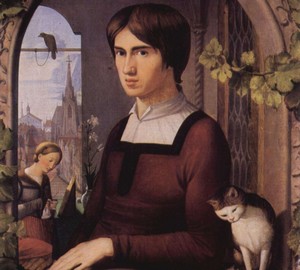
Description of the picture:
Portrait of the artist Franz Pforra – Friedrich Overbeck. Canvas, oil. 62 x 47 cm
Johann Friedrich Overbeck painted the portrait of his friend in 1810, and in 1812 Franz Pforra died, he died at the age of 24 of tuberculosis. For Overbeck, this is a huge loss and blow, because they became friends while studying at the Vienna Academy.
Both from Germany, they immediately felt a commonality of views, both dreamed of a revival of German art through romanticism and religiosity, through the sublimity and morality that young people drew from the masterpieces of the past Renaissance. They imitated the great painters, not only in the manner of painting, but in appearance. So, Pforr associated himself with Albrecht Dürer, Overbeck – with Raphael.
To this day, six paintings and dozens of drawings and sketches have come from the work of Franz Pforrah. Both German artists were the founders of the St. Luke society, which later became a Nazarene movement, which laid the foundations of German and European romanticism, and in the future, symbolism. This can be seen already in the early works of Overbeck, in the “Portrait of the Artist Franz Pforr.”
Here, each subject is symbolic and aimed at the main goal of their creative unification – the convergence of Italian and German painting, its renewal and rebirth. An arch and a grape twisting branch with fruits, a bird of prey, a girl with a Madonna’s face are typical Italian landscapes. The medieval formal costume of Pforra and the Gothic look outside the window are already German keynotes.
But the essence of what the author wanted to convey is understandable – the legacy given to the descendants of the painters of Italy and Germany belongs to everyone, that their merging and revival will give impetus to a new, patriotic, aesthetic, highly spiritual art.
These two artists until the end of their lives (Pforr – short, but clean and moral, Overbeck – long and dignified) were true to their oath and their activities and work have borne fruit in the future."